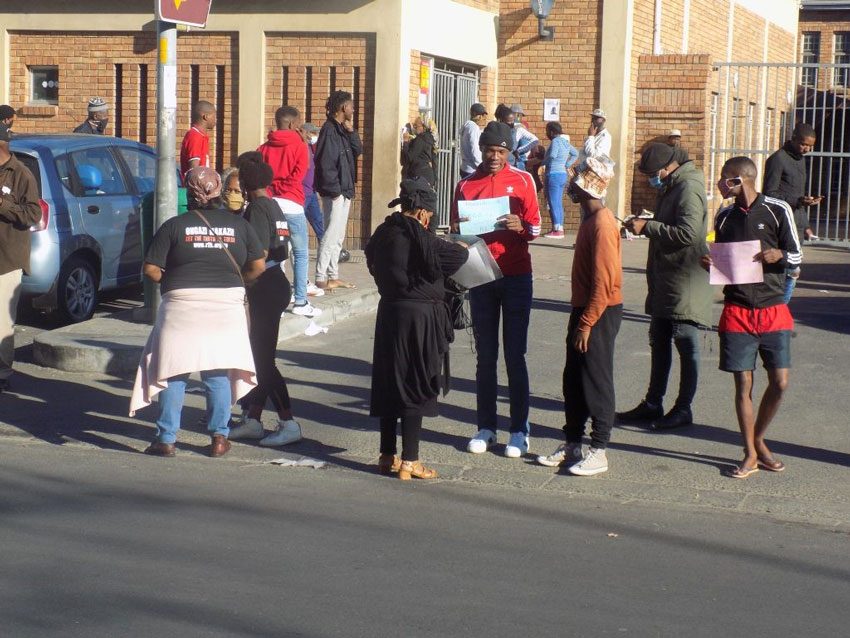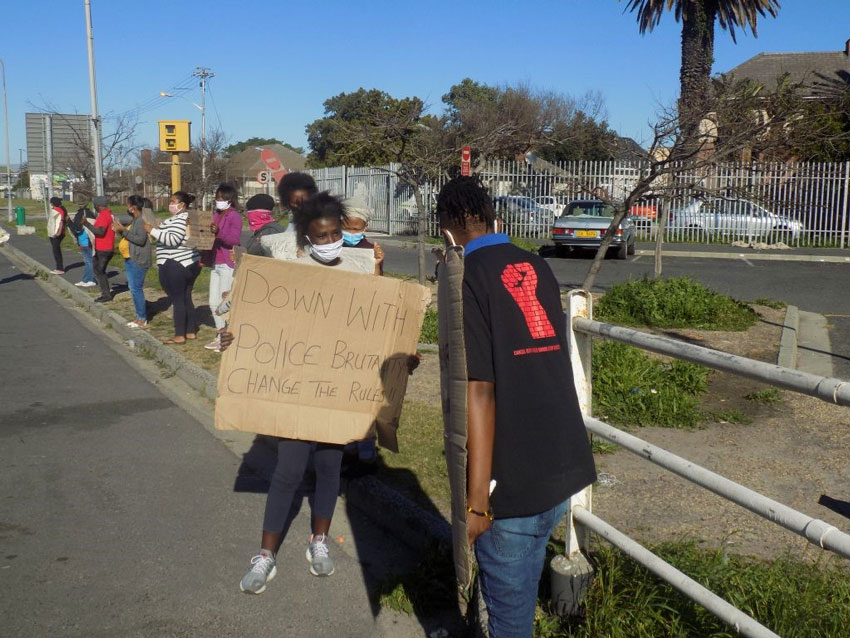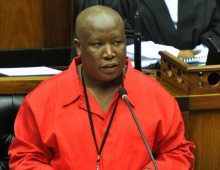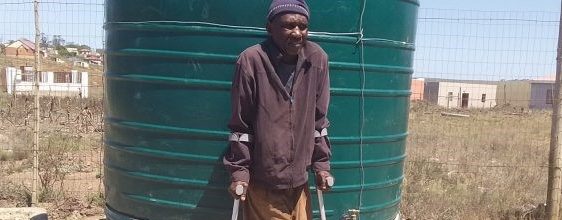Mzi Velapi, Lilita Gcwabe, Joseph Chirume, Ramatamo Sehoa
At the beginning of August a number of communities across South Africa vented their anger at the growing sense that working class people are being abandoned by the government during the Covid 19 pandemic. This article first appeared on Elitsha.
Protests around the country to mark the start of a national campaign by different organisations to build and connect community struggles against covid-19 and government austerity took place on Saturday, 1 August.
Civil society, community-based organisations, trade unions and activists protested in major cities and towns around the country to demand better living and working conditions. The protests were organised under the theme of “Working Class Day of Action”. The demands ranged from a universal basic income grant to the call for schools to be closed and the academic year to be scrapped. Other demands included:
- A universal healthcare system and mass testing to stop covid-19
- Permanent jobs and decent housing for all
- The rapid release of land for housing and communal farming
- A moratorium on retrenchments and evictions
- Stop police repression and GBV.
In Cape Town
About 20 people picketed outside Nyanga police station against police repression and gender-based violence. One of the protesters, Nonkosi Mcaphukiso from Gugulethu, said that the Nyanga police do not take sexual offences and gender-based violence seriously. “We are fed up, sanele. You report a case and you never hear from the police again. The majority of gender-based violence perpetrators walk around as they are not arrested.” Another protester, Maso Gcelu, relayed a story of how a friend went to the same police station to report a rape case and was made to wait until the next day before she could open the case. “The rapist was not arrested and the rape happened during the lockdown in April this year,” she said.

Another group protested against police repression outside Athlone Police Station. Lucinda Titus from Lavender Hill relayed a story of how her husband was manhandled by the police and the army after they accused him of filming them. “The police and the army were patrolling the streets and my husband was standing outside, inside the yard, and they asked him to stop filming them. He told them that he was not filming them and they asked for his phone. He ran into the house and they started to push and swear at everyone who was inside the house as they were chasing him… We felt violated as a family and that our dignity was stripped by the whole experience. Just because they have a uniform on they think they can treat us in an inhumane way,” said Titus.
Xola Qosha from Vygieskraal informal settlement in Athlone said that they are scared of the police in her area. “I have a recent experience where they came looking for my younger cousin and they ransacked my shack and broke a few zinc sheets that they said I must fix myself. We live in fear,” she said.

Members of the Housing Assembly and Right2Know protested outside Khayelitsha Police Station.
Activists and community leaders from Silvertown, an informal settlement in Malmesbury, joined them. The Silvertown community has been fighting police brutality after their service delivery protest was violently repressed.
Nomacebo Mbayo, Right2Know’s provincial organiser in the Western Cape, gathered with many others outside the Khayelitsha Police Station with a list of demands for the police. “Poor communities have a daily struggle of service delivery and our government doesn’t care. We are seeing large numbers of evictions; we see law enforcement brutally beating and arresting people. The army was trained to kill, and it got to a point where people were killed because of the deployment of soldiers. We want the police to protect us”, said Mbayo.
Nozuko Gonyiwe, a member of the Housing Assembly, went from her home in Silvertown, Malmesbury, to protest in solidarity outside the police station in Khayelitsha. Silvertown has not received basic services like water, electricity and sanitation for seven years. “We wouldn’t even be able to stand outside the station like this in Silvertown. When we try to have a peaceful march, the police arrest us, throw teargas and brutally beat us. They ask for information about who is leading the marches even though it is the whole community who is asking for services. They enter our communities at night with dogs, doing whatever they want to our homes and intimidating us. They criminalise us marching,” said Gonyiwe.
She says that the brutality became worse during the lockdown when residents of Silvertown began to ask for basic services from the municipality. “They expected us to stay at home but we have to go to the bushes to relieve ourselves and use one tap ten houses away. So how are we supposed to stay clean?” Gonyiwe asked incredulously.

Stephen Maciko, the secretary general of the Housing Assembly was arrested during a peaceful protest for housing in Malmesbury. He says he feels like he was targeted by the police even though the organisation had been meeting with the municipality for several weeks before about housing and land in Silvertown. “They chased me until I couldn’t run anymore and when I thought they were gone, they got me. It was unlawful because I was just picketing peacefully,” said Maciko.
In Port Elizabeth
Protesters in Port Elizabeth demanded a living wage of R12 500 per month, free basic services for the poor and an immediate end to corruption, both in government and in the private sector.
Siya Mama of the Assembly of the Unemployed called for government to provide a basic income grant for unemployed people.
Siya said, “The struggle for a basic income grant will be intensified now that Covid-19 has exposed the plight of the poor. We want the government to set the minimum wage at R12 500 per month. This should be a living wage not the slave wage currently being paid.
“We say no to the privatisation of Eskom as it is a plan to enrich the few at the expense of the poor. We are demanding the creation of 2-million climate change jobs and that the government ends corruption in all its entities.”

Mzikazi Nkatha of the South African Federation of Trade Unions castigated the Department of Health for forcing frontline healthcare workers to work without sufficient personal protective equipment (PPE).
“Our members are dying from Covid-19 due to non-provision of protective clothing and the lack of better knowledge on how to deal with the disease. The department is forcing us to remain at our work places even when some of our colleagues have tested positive for the virus. The head of the department, Dr Thobile Mbengashe, told us that he is the only one with the powers to close a clinic.
“We had deaths that should have been prevented. In Zwide alone, two of our members died and eleven tested positive for Covid-19. There were 28 positive cases at the Motherwell Community Health Centre and the department refused to close the clinic,” said Nkatha.
Lindiwe Dumanisile of the Young Nurses Indaba said, “As frontline health workers we should unite and complain with one voice especially during these difficult times of Covid-19. Nurses are being forced to work under life threatening conditions.”
In Johannesburg
Protesters in Johannesburg defied a heavy presence of the police and army who tried to limit the size of the gathering and enforce covid protocols of social distancing. “Social distancing cannot work here. Too many of us are already dead in our shacks and matchbox houses,” charged one of the protesters.

Maria Dube from Orange Farm Extension 7 says she took part in the march to seek an intervention from government after she received an SMS in March from Sivuseni EPWP informing her that she should no longer report to work. She worked for six years in this government programme as a cleaner and earned R2 500 a month. “This is very painful considering I’ve got children to feed. Again I had taken furniture at a retail store; I don’t know how I’m going to pay them,” she said.
Another protester, Mamsy Modibo from Tembisa in Ekurhuleni, said she lost her job when a cleaning project from Lungile Mtshali municipality was stopped although the municipality continues to get funds to empower the unemployed. “They told us it was just a short-term and a temporary project. We were stopped without any UIF benefits. Many of us had already worked for five years in that project.”
As they dispersed, organisers vowed to intensify mobilisation in the coming weeks and months.










